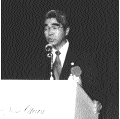Opening Address

| Katsuhiro Nakagawa Director General of the Machinery and Information Industries Bureau, Ministry of International Trade and Industry |

| Katsuhiro Nakagawa Director General of the Machinery and Information Industries Bureau, Ministry of International Trade and Industry |
It is my pleasure that I can speak to all of you on this special occasion of the opening of the 1997 Real World Computing Symposium.
The Real World Computing Project was authorized by the Ministry of International Trade and Industry and consigned to the Real World Computing Partnership.
On behalf of MITI, I would like to thank all of you for joining this symposium. Also, I wish to express my appreciation to Mr. Takashi Kitaoka, President of the RWC Partnership and Dr. Tamotsu Nomakuchi, Chairperson of the Executive Committee of the Symposium, for their great efforts in organizing this conference.
To develop a system capable of processing information as in the real world, many researchers have been engaged in exploratory activities under the Real World Computing Project for the five years since its inception in 1992. Consequently, many specific outcomes are gradually becoming clear and efforts are now being made to compile and finalize those project results so that they can be used during second half of the project.
Under such circumstances, I believe this RWC'97 symposium is being held at the right time, as it will provide us with a good opportunity to clearly understand the overview of all the results that the RWC researchers lead by Dr. Junichi Shimada, Director of the RWC Research Institute, have successfully achieved.
Based on the discussions and the conclusions that the Evaluation and Promotion Committee reached in the Spring of 1996, MITI has been working on the future direction and basic policies of the RWC Project which will enter a new phase in April, 1997. Within the fundamental framework of the Real World Computing Project, research activities will be decided by intensively investing resources in two major fields, which are; real world intelligence and parallel and distributed technology. In addition, an Evaluation Committee and Promotion Committee will be separately established to facilitate the project activities.
In our approach we will select specific research subjects not only by their immediacy to flexible information processing, but also their necessity and imminent importance in achieving such information technology. They will also be chosen according to which areas need research and development based on results of RWC Project's first phase.
MITI intends to develop a flexible information processing system that will become the Next Generation Fundamental Information Technology. The Preparatory Committee of the Next Generation Fundamental Information Technology Project, chaired by Professor Hidehiko Tanaka of the University of Tokyo, is playing a key role in preparing a specific plan of action for the RWC Project's next phase.
We will be in the 21st century when this international initiative is completed. In the 20th century, we have often expressed numerous dreams for the future in terms of the "21st century." I believe that a number of those dreams will come true through advanced information processing technologies. This project will assume an essential role in converting our dreams to reality; your cooperative efforts will be indispensable in accomplishing that purpose.
In conclusion, I hope this symposium will help drive the advancement of information technology, and provide all of you with a forum where you can freely exchange opinions and information.